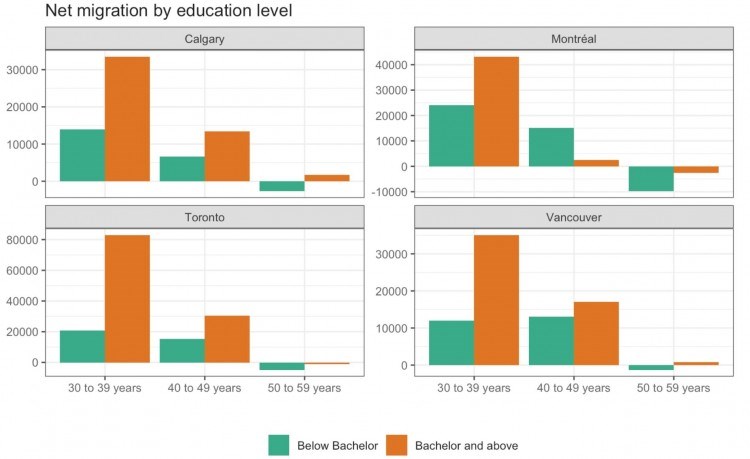Concerns that the high cost of housing is driving Metro Vancouver’s young professionals into a mass exodus to find more affordable homes in less expensive regions are unfounded, according to one data analyst.
Jens von Bergmann, founder of Vancouver-based analytics firm MountainMath, crunched census data between 2006 and 2016 and found more young professionals – defined as those with at least a bachelor’s degree – arriving in the Vancouver Census Metroplitan Area (CMA) than leaving it.
Von Bergmann broke down the numbers of people with bachelor’s degrees and those without in each of the 2006, 2011 and 2016 census reports, within three age groups. He found that in the Vancouver CMA, all but one of those cohorts increased in number during that time – and population growth was highest among young people with bachelor’s degrees (see chart below). The only cohort to slightly decrease in population in the Vancouver CMA during that decade was those aged 50-59 without bachelor’s degrees.
“Young people with university degrees continued to arrive in greater numbers than they left well through their thirties and on into their forties,” wrote von Bergmann in his blog on the topic.

Census data on net migration in four Canadian metropolitan areas by education level, between 2006 and 2016. Source: doodles.mountainmath.ca
Von Bergmann said there is no need to worry about a ‘brain drain’ in growing cities like Vancouver, and we don’t need to worry about professionals leaving.
“Due to better pay, professionals are better equipped to deal with a tight housing market than most others,” he said.
If we want to prevent more displacement, he said, we should focus on those actually at risk: the poor and working class.
“More housing can lead to a more equitable city with room for people who aren’t well-paid professionals or independently wealthy,” he said.
“That suggests both building more and promoting a lot more non-market and rental housing.”
Glacier Media Real Estate




